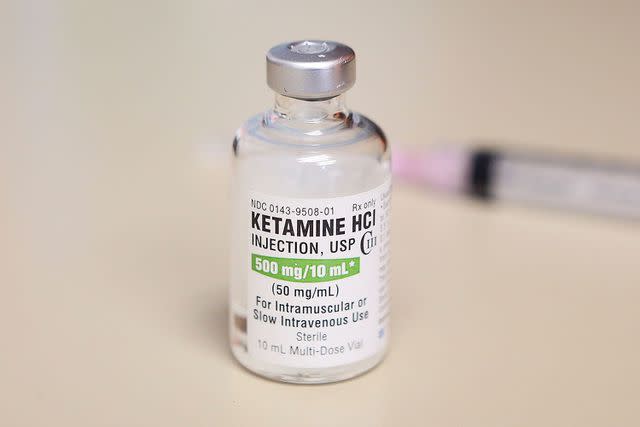Matthew Perry Died from 'Acute Effects' of Ketamine — What to Know About the Hallucinogen
- Oops!Something went wrong.Please try again later.
Matthew Perry — known for playing Chandler Bing on 'Friends' — died Oct. 28 at the age of 54

David M. Benett/Dave Benett/Getty
Matthew PerryOn Friday, Matthew Perry’s cause of death was determined and an autopsy report obtained by PEOPLE revealed that the beloved Friends star died due to acute effects of ketamine. Drowning, coronary artery disease and buprenorphine effects were also listed as contributing factors in his death.
According to the autopsy report from the Los Angeles County Coroner, the Friends alum was "reportedly clean for 19 months" before his death, which was ruled accidental.
The actor was practicing ketamine infusion therapy and his last treatment took place just "one and a half weeks before" his death, the report stated. However, the coroner noted that "the ketamine in his system at death could not be from that infusion therapy, since ketamine's half-life is 3 to 4 hours, or less."
Buprenorphine is a medication approved by the Food and Drug Administration to treat Opioid Use Disorder (OUD).
Ketamine is a "dissociative anesthetic that has some hallucinogenic effects," per the U.S. Drug Enforcement Administration. It "distorts the perception of sight and sound and makes the user feel disconnected and not in control," and "can induce a state of sedation (feeling calm and relaxed), immobility, relief from pain, and amnesia."
Ketamine was approved as a short-acting anesthetic by the U.S. Food and Drug Administration (FDA) in the 1970s. And in 2019, the Food and Drug Administration approved a nasal spray called esketamine, derived from ketamine, as a medication for depression.
However, the drug is also illegally taken to get high, as it can put people into a relaxed or detached state.
Over the years, many stars have opened up about using ketamine to specifically treat addiction in the past — including Lamar Odom, who said he saw it as a "healthy high" in helping him with substance abuse issues. Sharon Osbourne has spoken about pursuing ketamine treatment after developing anxiety in 2021.
More recently, Teen Mom star Tyler Baltierra told PEOPLE he started ketamine therapy to unlock repressed memories and help him work through childhood trauma, and Dynasty star Catherine Oxenberg also spoke with PEOPLE about her experience using ketamine therapy to overcome trauma after rescuing her daughter India from the NXIVM cult.
Never miss a story — sign up for PEOPLE's free daily newsletter to stay up-to-date on the best of what PEOPLE has to offer, from celebrity news to compelling human interest stories.

Ketamine therapy is a treatment that uses low doses of the drug in order to manage various mental health conditions, such as depression, anxiety disorders, and post-traumatic stress disorder (PTSD).
The American Psychiatric Association does not provide specific guidelines for the use of ketamine. But a 2019 study conducted at Massachusetts General Hospital found that patients with anxiety experienced lessened symptoms just 40 minutes after taking a low dose of ketamine.
Ketamine can come in different forms, including nasal spray, IV therapy, injections, and lozenges. Side effects of using the medication include nausea, dizziness headaches, dissociation, vertigo, drowsiness, psychosis and more.
In the past year, ketamine therapy clinics have been appearing throughout the U.S. At most clinics, patients start with a screening, and, if qualified, they get a shot of ketamine and are led through a guided meditation. Afterward they meet with a therapist. Treatments can run from $400 to $800 a session, on average, and aren't covered by insurance.
Although ketamine has gained popularity, it is only safe when prescribed by a doctor for a specific purpose.
If you or someone you know is struggling with substance abuse, please contact the SAMHSA helpline at 1-800-662-HELP.
For more People news, make sure to sign up for our newsletter!
Read the original article on People.

